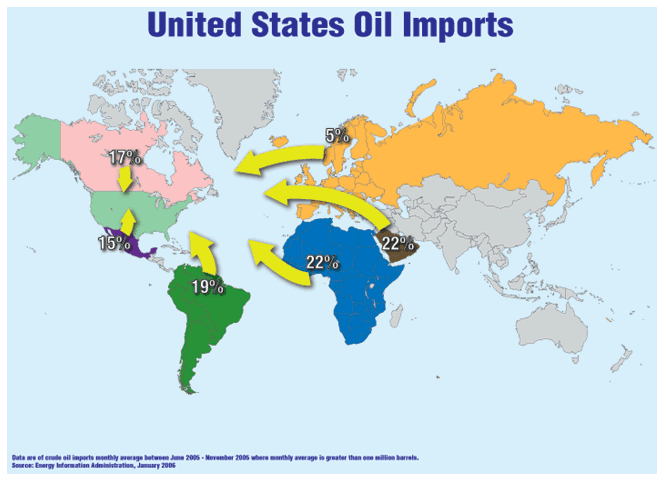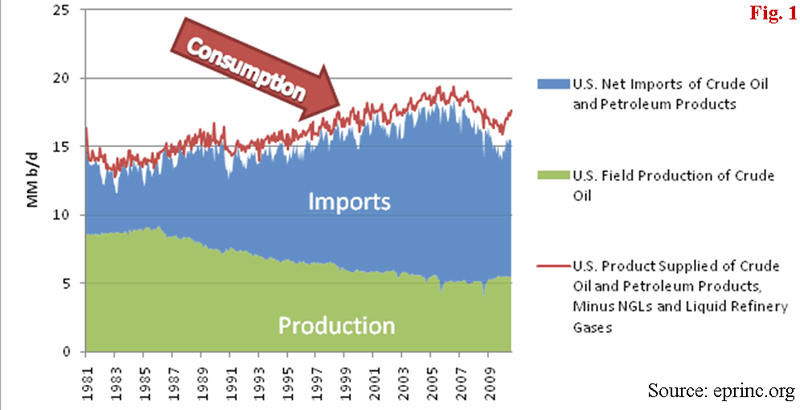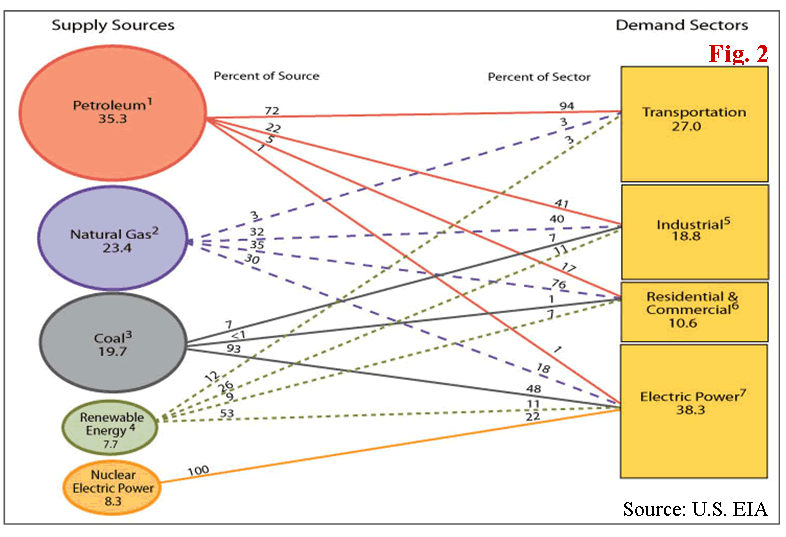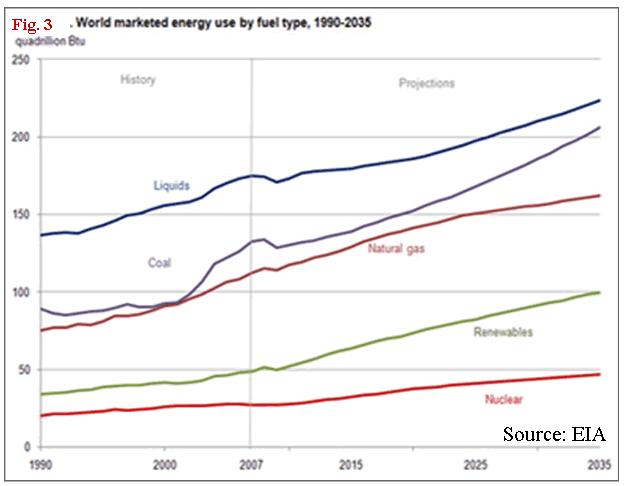Ban Crude Oil Imports for Energy Security?
Commodities / Crude Oil Mar 01, 2011 - 06:21 AM GMTBy: Dian_L_Chu
 I came across an interesting editorial at Houston Chronicle dated Feb. 26 written by Yale Graduates Energy Study Group discussing energy security and independence.
I came across an interesting editorial at Houston Chronicle dated Feb. 26 written by Yale Graduates Energy Study Group discussing energy security and independence.
In the article, the authors propose a federal policy (the "limits" policy) to withdraw U.S. crude and products imports from the world oil market, for example, in a 10-year period. During that period, all imports would be phased out to zero except Canada, whose pipelines run almost exclusively south into the U.S.

Consumer Loss vs. Producer Gain
According to the article, the limits policy would serve the national interest, reduce the costs of disruption in domestic markets due to attacks on foreign oil producers, and help more effective expansion in domestic oil and alternative energy production.
The authors further suggest, based on their cost-benefit analysis,
"...limiting imports from 2011 to 2021 would cost $40 billion in consumer losses, but generate $227 billion in producer gains from selling more domestic products."
In The Case Of $400 Oil
A $400 per barrel oil price scenario is also discussed if occurred before all imports are eliminated:
"...such a disruption would produce a total loss to the economy of $234 billion from a six-month shock under business as usual. Over the decade of the limits policy, these costs decline to zero for a disruption in 2021, even without including the producer gains during years when the shock does not occur."
Eliminations of defense spending on protecting shipping lanes and friendly oil-producing nations, and gains in U.S. employment and tax receipts for federal and state governments are two of the fringe benefits that could result from the "limits" policy.
Full article here at chron.com, and the following are some of my thoughts.
Bridging the Oil Supply Gap?
Based on the EIA data, liquid fuel net imports (including both crude oil and refined products) accounted for 57% of total U.S. consumption in 2008, and fell to 49% in 2010, primarily because of the Great Recession, and rising domestic production. And T. Boone Pickens said the U.S. spent $475 billion on foreign oil in 2008 alone, and projected over the next 10 years the cost will be $10 trillion
With staggering numbers like these, the idea of achieving zero foreign oil imports is intriguing as to the potential positive impact on the trade imbalance, budget deficits, etc. It is also the Holy Grail probably every country in the world is striving for.
However, regardless how the U.S. has come to be so oil and imports dependent, it is nevertheless a fact that needs to be taken into account whenever you are moving one of the energy chess pieces. As such, one thing that's glaringly missing in the article is addressing how to bridge the oil supply gap (Fig. 1), before, during and after the imports phase-out period.
A Drastic Move
Moreover, the proposal seems a bit drastic and might have the process backwards.
That is, instead of using the “limited” policy as a way to push for more effective domestic oil and alternative energy production, alternative replacement sources need to be secured before cutting off imports to avoid the potentially disruptive effect (e.g., the wealth transfer effect of the $40-billion consumer loss; the initial $234 billion loss from the $400 oil shock) and the economy as a whole (consumer spending still accounts for around 60-70% of U.S. GDP.)
Natural Gas, Coal…and Other Imports?
Let’s take a look at the possible replacement sources of the imported oil.
The U.S. dometic oil production is on the decline as pointed out by the EIA. In its Short-Term Energy Outlook released on Feb. 8, EIA noted domestic crude oil production, around 5.51 million barrels per day (bpd) in 2010, is projected to decline by 50,000 bpd in 2011 and by a further 190,000 bpd in 2012 due to production decline in Alaska, Gulf of Mexico, which would only be partially offset by the increase in production from onshore lower-48.
Renewables so far have only been able to provide a small portion of total U.S. energy consumption, and their collective role (along with nuclear power) as a major energy source would remain limited (Fig. 3) as compared with conventional sources, albeit with the fastest growth rate.
Oil shales, such as the Bakken formation in North Dakota, hold great promises; however, the steep production decline after the initial ramp-up has added some uncertainty in its role as a long-term reliable energy source.
These factors, coupled with limited domestic proven oil reserves (around 22.3 billion barrels) suggest in the zero oil import scenario, the U.S. would most likely need to rely more on natural gas and coal (Fig. 2), which there are ample domestic supplies, to replace the imported oil.
Furthermore, just as part of the natural resource depletion process, the shortfall is or will be so significant that it could still be necessary, one way or another, to import non-oil energy sources. Now, conceivably, the U.S. could import from more stable regions, but it is pretty hard nowadays to find places with enough resource that are completely immune to unrests and geopolitical tensions.
Can’t Live Without Yet
For now, EIA is projecting liquid fuel net imports (including both crude oil and refined products) will average 9.6 million bbl/d in 2011 and 10.0 million bbl/d in 2012, comprising 50% and 51% of total consumption in 2011 and 2012, respectively.
Elimination without Replacement = Disaster
World energy supply and demand outlooks from various agencies all pretty much tell the same story (Fig. 3)– we need all kinds of energy sources, fossil, renewables, other alternative technologies, etc. just to continue our social and economic development. Eliminating one source without having a plan for replacement could be disastrous.
The United States currently gets about 45% of its oil from the Middle East and North Africa, these regions hold over two thirds of the oil reserves worldwide. So, until the day renewables or other alternative technologies could successfully replace crude oil and products on a long term sustainable basis, oil most likely will remain one of the world's most important commodities, and foreign oil probably will be one piece of the U.S. energy pie for some time to come.
Meanwhile, I would be interested in learning more detail about the Yale Group’s study, as well as what readers think about their zero-oil-imports proposal.
Dian L. Chu, M.B.A., C.P.M. and Chartered Economist, is a market analyst and financial writer regularly contributing to Seeking Alpha, Zero Hedge, and other major investment websites. Ms. Chu has been syndicated to Reuters, USA Today, NPR, and BusinessWeek. She blogs at http://econforecast.blogspot.com/.
© 2011 Copyright Dian L. Chu - All Rights Reserved Disclaimer: The above is a matter of opinion provided for general information purposes only and is not intended as investment advice. Information and analysis above are derived from sources and utilising methods believed to be reliable, but we cannot accept responsibility for any losses you may incur as a result of this analysis. Individuals should consult with their personal financial advisors.
© 2005-2022 http://www.MarketOracle.co.uk - The Market Oracle is a FREE Daily Financial Markets Analysis & Forecasting online publication.






